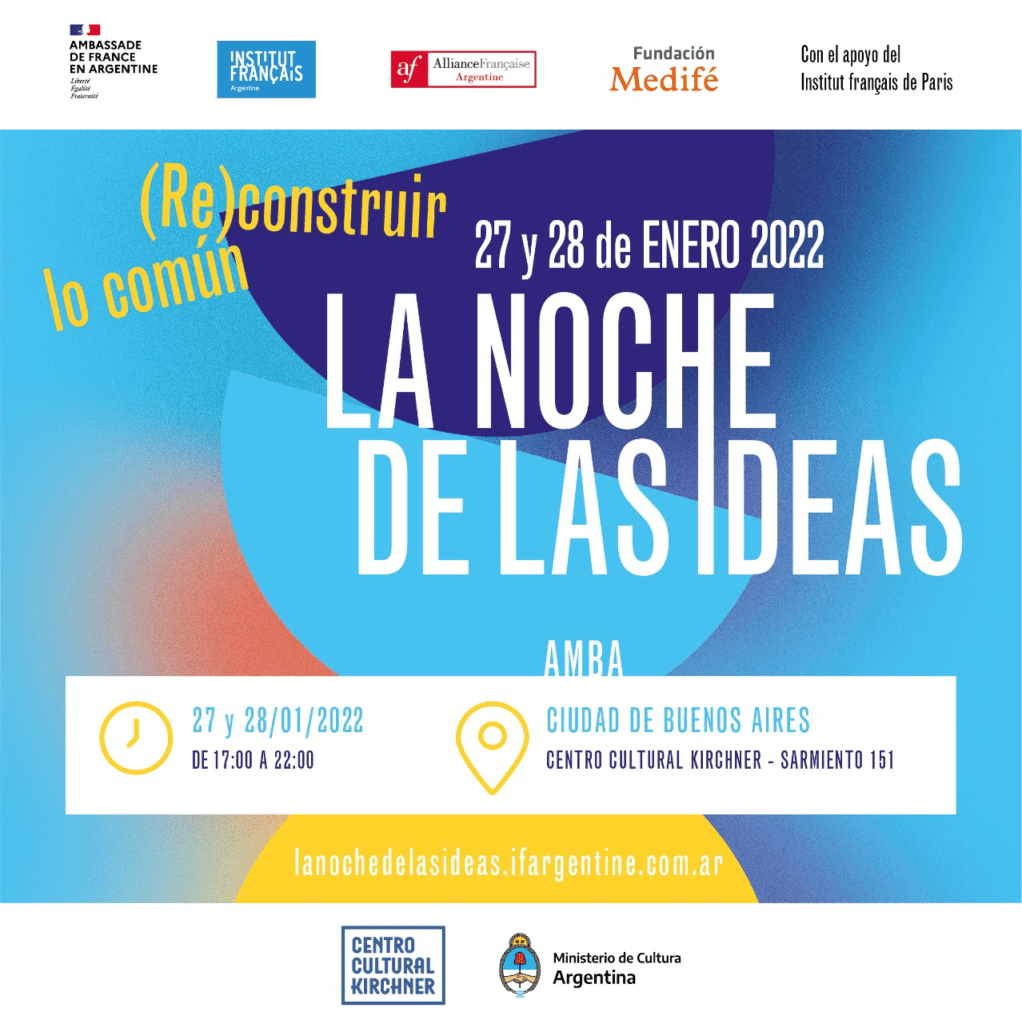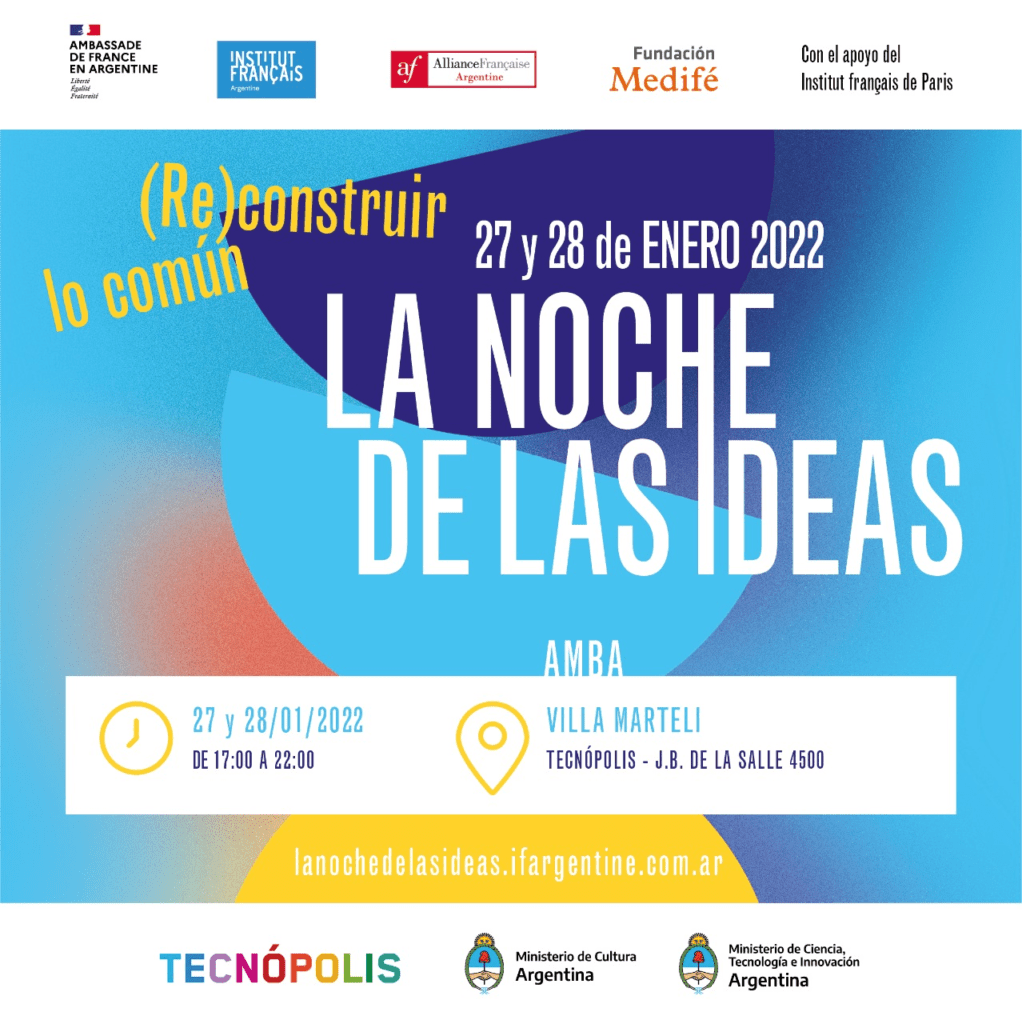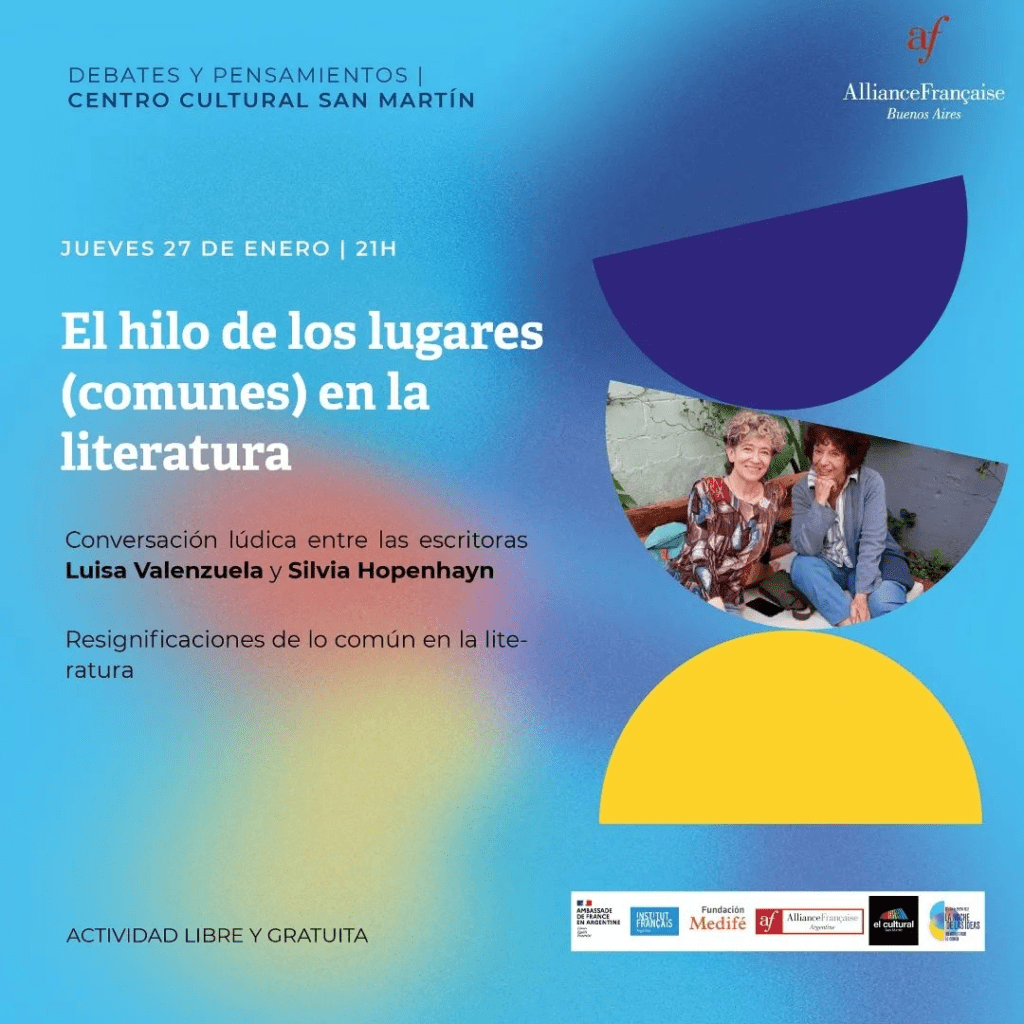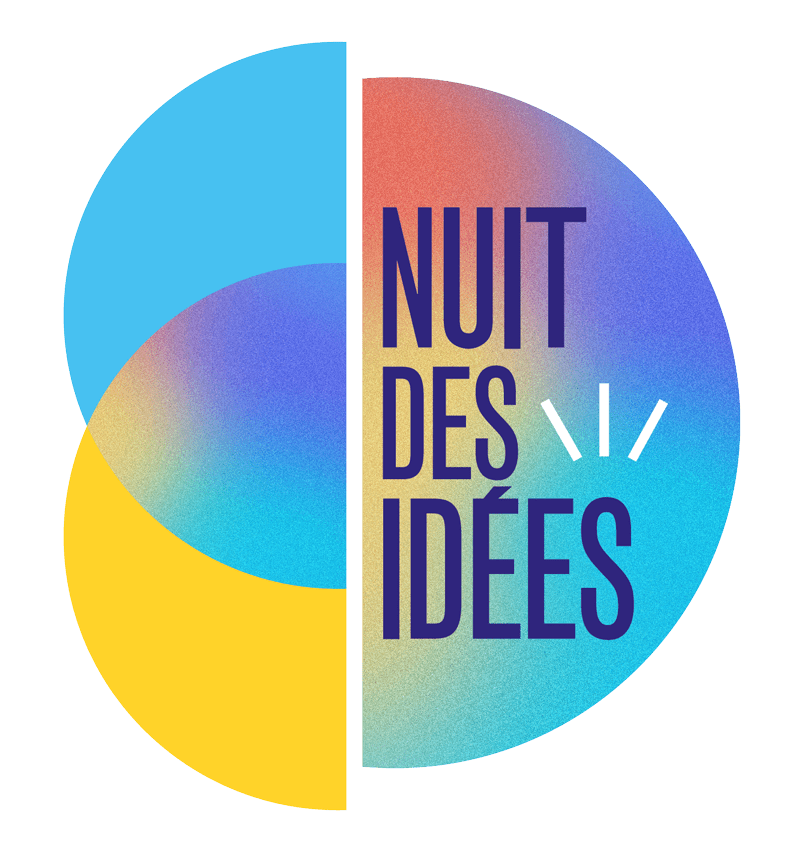CABA: the capital at the heart of the debate





- 27/01/2022
- Local: 14h00
Paris: 18h00 - Centro Cultural Kirchner Sarmiento 151, Buenos Aires, AR
- Argentina
- Spanish / French
- https://lanochedelasideas.ifargentine.com.ar/
In the autonomous city of Buenos Aires and in the province of Buenos Aires, the Night of Ideas will integrate different thematic approaches. Among them, the question of the origin of the human species, the "Basuroceno" or the critique of the economy of waste, digital capitalism and its "techno-feudalist" logic, utopias, the manufacture of dissidence and the decolonisation of psychoanalysis. All these approaches aim to animate debates of ideas around the notion of the 'commons', that is, what affects and engages us together and how to intervene in it. These events also address the question of memory as a subject for thinking about the present and the future. For example, the filming of the legal processes of crimes against humanity and the possibility of reconstructing utopias will be addressed as subjects of particular importance in the country and the region.
● Tecnópolis - Friday 28 January
18h00. Map and performance by the artist REP (Miguel Repiso)
19:00 Science Room
Panel discussion: "Identities without limits. Recognising oneself in the common origin of humanity and in migrations. An experience of international cooperation".
Speakers: Alejandra Korstanje, Leticia Cortés, Christophe Giudicelli, REP, Cédric Robion
20:00 Science room
Screening of "Kromdraai 90" by Cédric Robion How did humanity come into being? In Kromdraai, the palaeoanthropologist José Braga has unearthed the remains of two children: one is human, the other a Paranthropus, the oldest ever discovered! They are the starting point for pioneering research that could finally reveal the origins of our species.
● Centro Cultural Kirchner (CCK) -Thursday 27 January
17:00 to 18:00 Salon d'Honneur
Debate: "El Basuroceno: Homo detritus". Critique of the waste economy by Baptiste Monsaingeon, sociologist, University of Reims, author of Homo Detritus. Critique de la société du déchet, Paris, Seuil (2017), with Enrique Viale (lawyer, founder of the Asociación Argentina de Abogados Ambientalistas (AAdeAA)).and Mónica Cappellini, director of CEAMSE (Coordinación Ecológica Área Metropolitana Sociedad del Estado).
In this conference, the author will analyse the relationship between contemporary societies and their waste. It will attempt to analyse the impact of human activity on the Earth over the years and will raise debates on the consequences of industrialisation and economic growth, the role of eco-citizenship and the utopia of a world without waste. Moderator: Christophe Giudicelli
7.30 pm to 8.30 pm Hall of Honour
Reading "Nobody can be happy" by Darío Sztajnszrajber
"Nobody can be happy" is a philosophical exercise that seeks to rethink this maxim through the deconstruction of its four concepts: what definition of happiness do we start from, is "nobody" the subject or is it the absence of a subject, can power be thought of differently, is the question of being still relevant?
-Friday 28 January
17:00 to 1800 - Hall of Honour
Talk Artistic creation and industrial production in the 20th century. Deconstructing or reconstructing the commonplace. By Cécile Dazord (chief curator, museologist, coordinator of "Filmer les procès") and Isabelle Plante (UNSAM-Conicet- Centro de Investigación de Arte y Patrimonio de la Universidad Nacional de San Martín (Ciap-Unsam-Conicet). Moderator: Luciana de Mello (novelist and journalist)
18:00 to 18:45 La Ballena Terrace
"SISTEMA O', choreographic creation by Diana Szeinblum
This is a work that was created in residence in 2021, as part of the "TRANSDUCCIONES" cycle, with the general coordination of Silvio Lang and the theoretical advice of Marie Bardet, within the framework of the Centro Cultural Aroldo Conti and the support of the French Institute. The work consisted in putting us in relation with the written work of Isabelle Stengers (philosopher), "Au temps des catastrophes". SISTEMA 0 is the creation of a stammering system, collective, with the desire to exist, without the mission to advance, perforating the given, literally paying attention, to enter the recesses of the species. From this place we see the catastrophe: detachment from experience is the catastrophe. Being able to think and act from experimental production confirms what Stengers says: experimentation is politics.
Performers: Alina Marineli, Pablo Castronovo, Margarita Molfino, Andres Molina, Eugenia Roses. Assistant Jazmin Tesone. Idea and direction Diana Szeinblum
19:00 to 20:30 Hall of Honour
Conference "Tecnofeudalismo. What digital technology does to capitalism and vice versa" by Cédric Durand (Prof. of La Sorbonne, Paris) author of Tecnofeudalismo published by La Cebra. We live in a feudalism typical of modern times, far from the freedom and equity promised by the new technologies. The author questions digitalisation because it increases the international division of labour and intensifies dependency. Julián Varsavsky (journalist) and Mariana Heredia (Conicet-IDEAS/Unsam) comment.
● Centro Cultural San Martín
-Thursday 27 January
Room E - "Mi Furosato" - Holographic installation, series of monologues, by Mélanie Pavy, (60′, 2018) curated by Cécile Dazord.
CINEMA: From 2pm to 8pm.
Programming in room 2
● 14h. System K by Renaud Barret (2017) documentary 1h34h.
The film is about Kinshasa. Documentary about the vibrant street art scene in Kinshasa.
● 16h. The Assembly by Marianne Otero (2017) duration 1h39.
This film is about the "Nuit debout" movement on the Place de la République in Paris in 2016.
● As part of the International Holocaust Remembrance Day. 6pm. Nuremberg, the Nazis face their crimes(2006) by Christian Delâge, duration 1:30 min.
Documentary on the Nuremberg war trials of 21 Nazi dignitaries held after the Second World War. Twenty-two of the most senior Nazi leaders, including Hermann Göring, Rudolph Hess, Joachim von Ribbentrop and Wilhelm Keitel, are on trial. Christian Delâge is a historian and director of the Institut d'histoire du temps présent, CNRS, Paris.
● 20h. 200,000 ghosts by Jean-Gabriel Périot (2007) 11mn.
A reflection on the archival images of the A-bomb Dome. A former Japanese business centre built in 1915, the Dome became the symbol of the destruction of the city of Hiroshima by the American atomic bomb in 1945, the only building still standing in the direct vicinity of the explosion. It has never been restored.
● Featured film
21h. Braguino(2017) documentary by Clément Cogitore
In the middle of the Siberian taiga, 450 miles from the nearest town, live two families: the Braguines and the Kilines. The only way to reach Braguino is a long journey along the Yenissei River, first by boat, then by helicopter. Self-sufficient, the two families live by their own rules and principles and refuse to talk to each other. On the river is an island where another community is being built: that of the children. Free, unpredictable, wild
● Room A
18h. French "La route des azulejos".
From 6:40 to 7:00 pm: influence on the architecture of the Rio de la Plata.
Clemencia Ruiz Moreno (USAL) has a degree in tourism and is a tile collector. The tiles she collects began to be made from 1820 in the village of Desvres, Pas-de-Calais, in northwestern France, following the tradition of Delft, Holland. These were family-run factories that greatly simplified the technique. Around 1840 they became popular in the Rio de la Plata and became part of the everyday architecture of Buenos Aires and Montevideo.
● In the Plaza de las Américas (or in a covered patio depending on the weather).
-7pm: "Rethinking Utopias". Is it possible to recover the utopias of early French socialism as a starting point for thinking about what is to come? Ludovic Frobert, CNRS, historian, Ecole Normale Supérieure de Lyon; specialist in economic thought and socialist movements of the first 19th century.
Alejando Galliano (UBA), essayist, Omar Acha (Conicet-UBA), historian.
Moderator: Christophe Giudicelli, historian (Sorbonne University/Centre Franco-Argentin de Hautes Etudes)
8pm: The factory of dissent: A new cultural and political hegemony based on extreme antagonism, on agonism, to impose an ultra-conservative vision of the world that challenges the democratic consensus.
Sarah Al-Matary, Université Lumières-Lyon 2; member of the Institut Universitaire de France; specialist in literary history and history of ideas; author of La Haine des Clercs, Seuil 2019; editor of La vie des Idées / Factory of dissent.
Pablo Semán (Conicet-IDAES/Unsam), sociologist José Natanson, political scientist and editor (Capital Intellectuel, Le Monde Diplomatique) -Moderator: Christophe Giudicelli, historian (Sorbonne University/ Centro Franco Argentino de Altos Estudios).
9pm "The thread of (common) places in literature".
A playful conversation between the writers Luisa Valenzuela and Silvia Hopenhayn (recently appointed Officer of Arts and Letters). The resignations of common places in literature.
-Friday 28th January
Room E: 'Mi Furosato'. Holographic installation series of monologues, by Mélanie Pavy, (60′, 2018) curated by Cécile Dazord.
CINEMA: From 2pm to 8pm. Room 2
2pm: Wardi is an animated film by Mats Grorud, 2017, duration 1h20.
It deals with the conflicts in the Middle East from the point of view of an 11 year old Palestinian girl. Her family tries to rebuild the lost hope of returning to the land her great-grandfather was forced to leave in 1948.
4pm: Petite fille / A little girl by Sébastien Lifshitz (2020), duration 1h25.
This is the story of Sasha, in the first person, a little girl who dreams of becoming a woman since she was a child. This film is part of the most current discussions on the transition process in childhood and LGTBQ+.
6pm: Gloria Mundi by Robert Guédiguian (2019), duration 1h57.
This is the story of the life of a man who has spent time in prison (stopped time) and who, on his release, sees how he has spent time in life in freedom. The difficulties of personal life are mixed with those of social life. Reinventing oneself is a challenge to overcome the bad times.
Featured films
20h . Los nuevos modernos(2016) documentary by Violeta Ramírez, duration 45 min.
More and more people are feeling uncomfortable with consumerism. Here and there, in the interstices of consumer society, individuals and communities are inventing new ways of living. By combining voluntary sobriety and ecological experimentation, the New Moderns directly challenge the precepts of modernity.
21h30. Braguino(2017) documentary by Clément Cogitore
In the middle of the Siberian taiga, 450 miles from the nearest town, live two families: the Braguines and the Kilines. The only way to reach Braguino is a long journey along the Yenissei River, first by boat, then by helicopter. Self-sufficient, the two families live by their own rules and principles and refuse to talk to each other. On the river is an island where another community is being built: that of the children. Free, unpredictable, wild.
Room A 6.30 pm
Workshop "Writing as a process of reconstruction of memory".
Writing has been and is the result of the human need to leave a testimony. It is also the refuge of memory. Based on the screening of the documentary "El otro río. Rafael Alberti y su exilio argentino" ("Another river. Rafael Alberti and his Argentinean exile") written and directed by Alicia Ovando, the author, a lecturer in audiovisual communication (UCA) and Teresa Téramo, Dr Cs Comunicación (Spain), a lecturer in literature (UCA) will talk about the process of anchoring and reconstructing the memory Duration: 1h30.
-In the Plaza de las Américas or in the covered patio (depending on weather conditions)
8pm "Decentring psychoanalysis to intervene in the common".
Rethinking psychoanalysis from the margins. A postcolonial reading with a gender perspective. Livio Boni, psychoanalyst, International College of Philosophy https://laviedesidees.fr/L-inconscient-post-colonial.html
Jorge N. Reitter, psychoanalyst, Universidad Nacional de Zacatecas, Mexico Moderator: Alejandro Dagfal, Faculty of Psychology of Conicet-UBA






